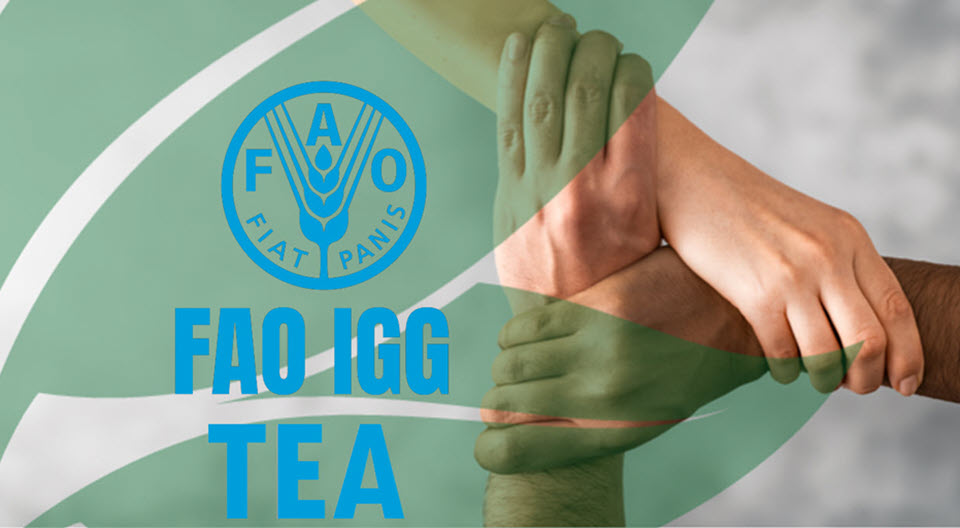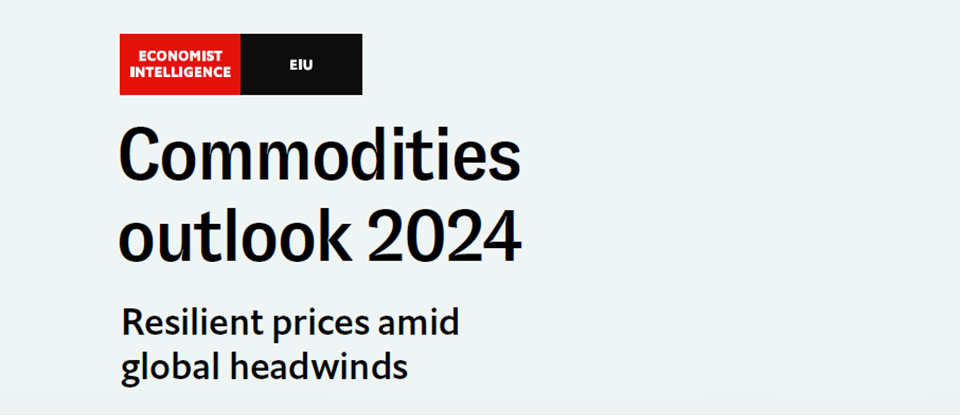Episode 154
The UN FAO IGG Confederation of Tea Smallholders Will Relocate its Headquarters from China to India for the Next Four Years | Iran Tea Imports Plunge by 62% | Economists Forecast Higher but Stable Prices for Beverage Soft Commodities in 2024
Tea News for the week ending February 9, 2024
Featured
Delegates from 44 countries (and 14 official observers) who attended The 25th Session of the United Nations Food and Agriculture Organization’s Intergovernmental Group on Tea (IGG Tea) on Jan. 31 expanded the organization’s mandate beyond trade aspects, ratifying initiatives addressing all three dimensions of sustainability – economic, social, and environmental. Peter Goggi, IGG TEA delegate representing the US as President of the Tea Association of the USA, discusses #TeaPower, a new health and wellness campaign, FAO’s ongoing support of smallholders, and the economics of oversupply.
Listen to the Interview
Powered by RedCircle

UN FAO IGG Confederation of Tea Smallholders Relocates to India
By Dan Bolton
The headquarters and staff of the Confederation of International Tea Smallholders (CITS) will relocate from China to India for the next four years. Delegates to the 25th Session of the United Nations Food and Agriculture Organization’s Intergovernmental Group on Tea (IGG Tea) ratified the decision during their recently concluded three-day session in Guwahati.
According to IGG Tea, smallholders hold a position of growing importance in the tea sector, where they cultivate 70% of the global acreage under tea. Smallholders pluck 60% of raw tea leaves and produce a sizeable amount of finished tea.
The announcement notes: “Their vitality and integral role within the tea supply chain cannot be overstated. Solving this sector’s issues is essential for the long-term viability and health of the tea industry, not to mention the farmers and their communities themselves.”
IGG delegates, one each from 44 producing countries and non-voting officials from 14 countries, praised the Government of India and the Assam government for their significant investment in the development of the small tea growers’ sector, citing the dedicated research and development work at the Tocklai Tea Research Center in Jorhat.
The federation (CITS) was established in May 2016 by delegates to the 22nd Session of FAO IGG on Tea meeting in Naivasha, Kenya. The federation was envisioned as “a forum for developing policies and solutions to strengthen the global tea smallholder sector by acting as a convener, catalyst, and resource to improve the consistency of tea policymaking on a global level.”
BIZ INSIGHT – Joydeep Phukan, Secretary of the Tea Research Association at Tocklai and Coordinator of the FAO IGG on Tea for India, told Tea Biz’s Roopak Goswami that “Moving CITS to India will synergize the efforts of federal and state governments as well as the Tea Board of India in bringing the global best practices to small tea growers of India.”

Iran Tea Imports Plunge by 62%
One of the world’s top tea-drinking countries saw tea imports plunge 62% in value during the first ten months of the Iranian calendar year, which begins in March.
The Tasnium New Agency reported only $185.75 million worth of tea was imported from eight origins, according to the Islamic Republic of Iran Customs Administration. Volume declined to 33,683 metric tons as shipments from India dwindled.
Shortages have been reported, but the steep decline suggests that traditional suppliers are shipping more tea to surrounding countries where the non-tariff barriers to trade are lower.
Iran typically consumes about 21% of India’s annual tea exports. Indian traders report exports to Iran declined by 15.7 million kilos from January to October 2023. Tea exported from India is down overall, but shipments to Iran showed the most significant drop.
Indian producers say restrictions on Iran’s inability to trade in US dollars result from sanctions first imposed in 1979 and additional European sanctions imposed in 2010, are preventing timely payments. The higher transport cost in war-ravaged regions, including the Black and Red Sea, further complicated trade.
In November 2023, Iran halted tea imports at the request of Iran’s federal Inspection Organization. Investigators accused the CEO of Debsh Tea, the nation’s largest tea company and sole tea importer, of embezzling $3.4 billion in subsidies (about three trillion in local currency). Around $300 million is budgeted annually to purchase orthodox grades and tea for blending. Investigators became suspicious when that sum had tripled in recent years and eventually uncovered evidence of currency manipulation and fraud involving customs officials, members of the country’s central bank board, top executives in the food safety department, and office holders. The four-year scheme is the largest embezzlement in Iran’s history.
BIZ INSIGHT – Iranian tea exports also steeply declined by 12,828 metric tons. Value fell by 58% compared to the 2022 fiscal year ending March 2023. In the past, Iranian growers produced as much as 70,000 metric tons of tea to meet domestic demand. Iran still ships locally grown tea to 25 countries but at far smaller volumes than in the early 2000s. Tea exports peaked at 21,000 metric tons in 2000 before bottoming out at 4,500 metric tons in 2003 following the imposition of sanctions tied to nuclear development that continue to interfere with timely payments.

Stable Price Outlook for Soft Commodities in 2024
Tea is classified as a soft commodity, one of several grown in the tropics and delivered globally along supply chains similar to coffee, cocoa, sugar, and spices.
The sector has experienced three years of extreme volatility attributed to escalating geopolitical tensions, soaring pandemic-induced shipping costs, and adverse weather conditions.
Last week, the Economist Intelligence Unit (EIU) predicted risks would ease and prices would stabilize in 2024. In its “Commodities Outlook 2024,” EIU writes, “El Niño and the Russia-Ukraine war still loom large for soft commodities. Prices for food, feedstuffs, and beverages (FFB) will rise throughout 2024, driven primarily by beverages, as El Niño will hit production, and therefore, prices for coffee and cocoa will increase.”
In the section subtitled “Resilient Prices Amid Global Headwinds,” EIU writes there is “Some relief in sight, with the US National Oceanic and Atmospheric Administration (NOAA) giving a 72% chance that El Niño will end by mid-year. But the damage to this season’s harvests will already be done by then, with coffee and cocoa production forecast to fall by 9% and 13%, respectively, in the 2023/24 crop season.
At least the threat of a “historically strong” El Niño is waning significantly, according to NOAA. NASDAQ reports that (Intercontinental Commodity Exchange) Arabica coffee futures
- ICE Arabica coffee futures rose to the highest price since 2011 in 2022 but closed in 2023 at $1.90 per pound, a 12.5% gain from the previous year.
- ICE cocoa futures exploded 61.4% higher in 2023, closing the year at $4,196 per ton.
Energy prices, excluding crude oil, will trend downwards in 2024. Prices of hydrocarbons will largely trend in the opposite direction than those of most industrial raw materials and soft commodities, writes NASDAQ.
FEATURE

Observations on Tea Oversupply
By Dan Bolton
“The IGG is a fabulous opportunity for all interested parties on a governmental level to talk about the tea industry,” says UN FAO IGG TEA Delegate Peter Goggi, president of the Tea Association of the USA. “It’s essential to express their views. They all have issues that they’re facing. The problems facing countries of origin differ significantly from those facing consuming countries. But ultimately, solutions that satisfy both need to be met,” he says, adding, “The overriding concern of all parties in this business is the lack of profit throughout the supply chain.” Read more…
Listen to the Interview
Powered by RedCircle
Share this Post
Episode 154 | The UN FAO IGG Confederation of Tea Smallholders Will Relocate its Headquarters from China to India for the Next Four Years | Iran Tea Imports Plunge by 62% | Economists Forecast Higher but Stable Prices for Beverage Soft Commodities in 2024 | PLUS UN FAO IGG Delegate Peter Goggi Discusses The Economics of Oversupply | 9 Feb 2024
Sign up to receive Tea Biz weekly in your inbox.


